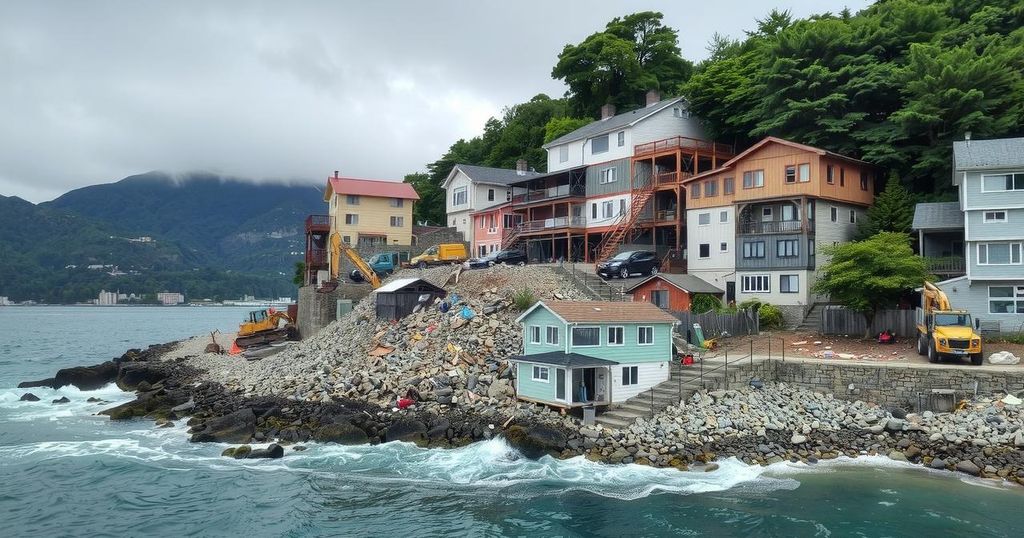One Year Post-Noto Peninsula Earthquake: Addressing the Hidden Toll of Isolation and Cultural Loss

One year after the Noto Peninsula earthquake, the region faces significant challenges beyond physical destruction, including mental health crises related to isolation and rising suicide rates, as well as cultural erosion. The response to disasters often neglects these long-term impacts, indicating a pressing need for improved recovery strategies that encompass psychological and cultural aspects of community rebuilding.
A year has passed since the Noto Peninsula earthquake struck Ishikawa Prefecture on January 1, 2024, causing extensive physical damage and revealing deeper, lasting challenges. While the initial aftermath saw over 220 confirmed fatalities, the ongoing psychological impact and cultural erosion pose severe risks that demand attention. The focus here is on the hidden toll of isolation and mental health struggles like suicide, as well as the loss of cultural identity within these communities, emphasizing the need for a comprehensive recovery strategy that goes beyond rebuilding infrastructure.
The Noto Peninsula earthquake’s immediate aftermath resulted in visible destruction, yet the subtler, more insidious effects of isolation and mental health issues surfaced as grave concerns. As observed during recovery efforts, many survivors expressed feelings of loneliness, while temporary housing became a breeding ground for mental distress. Elderly residents articulated how the disaster severed once vibrant community ties, exacerbating emotional turmoil that often leads to despair and suicidal thoughts. As such, the streets and structures may have remained, yet the connection and support network fundamental to community cohesiveness severely dilapidated.
The cultural implications of the disaster also remain dire. The Noto region is rich with traditions that foster community spirit; however, many cultural sites, including venues for festivals and historical landmarks, have been destroyed. This loss extends beyond property; it threatens the very essence of community festivals and intergenerational rituals, deepening the emotional distress that residents face. Survivors reported that their sense of belonging was shattered, leading to a generational disconnect, as younger individuals begin relocating in search of stability.
Reflecting on these trends, it becomes increasingly evident that society must learn from past tragedies. Historical disasters, such as the Great Hanshin-Awaji Earthquake in 1995 and the Great East Japan Earthquake in 2011, revealed a pattern of neglected psychological ramifications following the physical recovery. Unfortunately, Noto is reminiscent of these prior events; the emerging trend of disaster-related deaths underscores the urgency for societal change. Without adequate measures in place, such as mental health support and cultural preservation initiatives, communities remain vulnerable.
In light of this crisis, proactive societal responses are essential in addressing the needs of survivors. Initiatives must prioritize emotional and cultural healing alongside physical reconstruction. Organizations like Civic Force exemplify the necessary approach by fostering community connections and preserving cultural practices. However, broader, sustained efforts must follow to create robust support systems and counseling services that cater to mental health realities while maintaining cultural continuity.
The pressing question in the aftermath of the Noto disaster is not only about rebuilding infrastructure but also about safeguarding the communities affected from further invisible tragedies. It is crucial that society acknowledges and actively address both the psychological and cultural scars left behind, ensuring that everyone affected by such disasters has the opportunity to heal and thrive. Failure to embrace these lessons will result in a repeated cycle of tragedy that continues to haunt future generations.
The Noto Peninsula earthquake, which struck on January 1, 2024, with a magnitude of 7.6, not only caused immediate physical devastation but has also revealed significant longitudinal challenges within the affected communities. As recovery efforts unfold, the initial casualty figures, though tragically high, do not fully encapsulate the ongoing mental health struggles and cultural identity crises impacting survivors. This multifaceted issue demands urgent attention as it highlights the long-term ramifications that often overshadow direct disaster consequences.
In conclusion, the one-year reflection on the Noto Peninsula earthquake reveals a critical need for society to adapt its disaster recovery frameworks. Acknowledging the psychological, cultural, and emotional impacts of such events is essential in fostering resilient communities. By prioritizing comprehensive support systems and attentively documenting survivor experiences, we can pave the way for a future where healing encompasses more than just physical restoration, ensuring that cultural identities and community connections remain intact in the face of adversity.
Original Source: japan-forward.com








